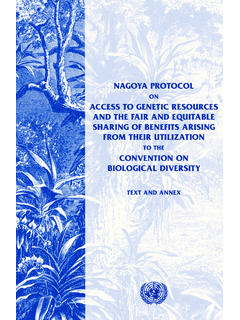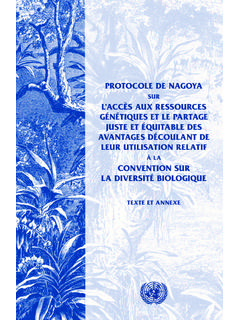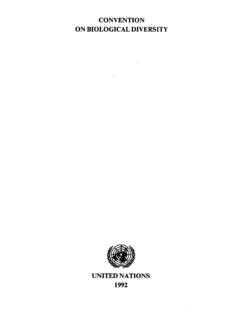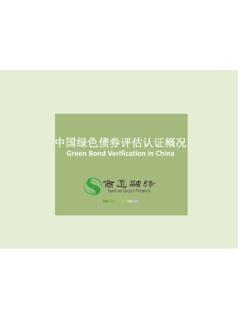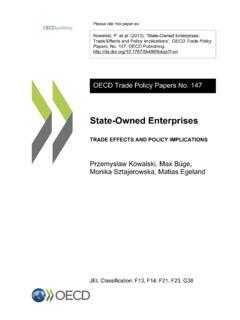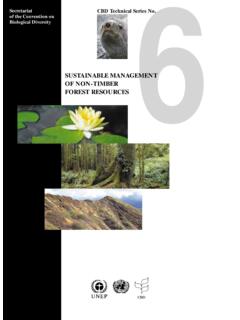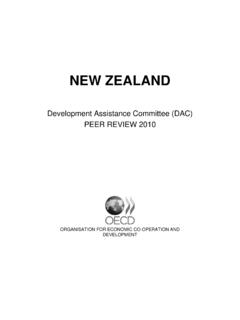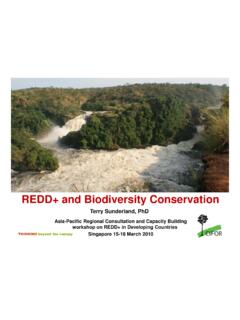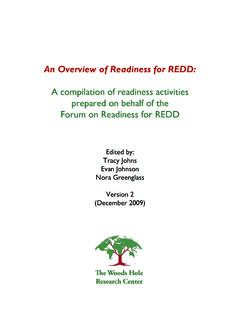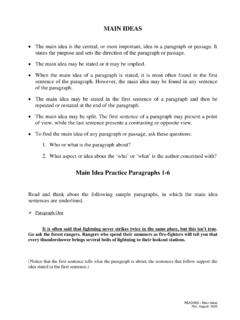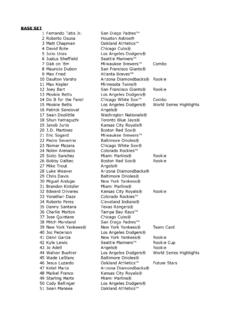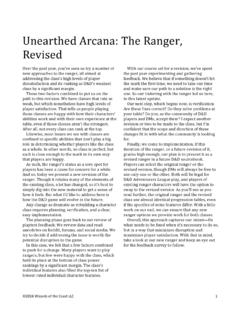Transcription of REPORT OF THE FIRST WORKSHOP FOR THE TRAINING OF …
1 1 REPORT OF THE FIRST WORKSHOP FOR THE TRAINING OF TRAINERS USING THE E-LEARNING MODULES ON THE CBD PROGRAMME OF WORK ON PROTECTED AREAS IN THE PRCM SUB-REGION OF WEST AFRICA. N gor Diarama Hotel, Dakar, 21 to 25 November 2011 I- Introduction 1. In May 2011, the Secretariat of the Convention on Biological Diversity (CBD) organized in Dakar with WWF and other partners a Sub-Regional WORKSHOP for West Africa on Capacity-building for Implementation of the CBD Programme of Work on Protected Areas (PoWPA). At the conclusion of the WORKSHOP , it was emphasized that the WORKSHOP was part of an ongoing process of TRAINING /learning and technical support within a sub-regional network. It was also noted that the support network would benefit from the online PoWPA e-learning curriculum and over a thousand tools on the PoWPA posted on the CBD website. The CBD Secretariat and WWF WAMER agreed to cooperate and organize a follow-up activity in the form of a TRAINING -of-trainers WORKSHOP using the PoWPA e-learning modules.
2 This activity supports the implementation of the CBD PoWPA, a number of decisions of the CBD Conference of the Parties (COP) on protected areas (PAs) including decisions IX/18 and X/31 on PAs, X/29 on marine and coastal biodiversity, and X/2 on the Strategic Plan for Biodiversity 2011-2020 and its Aichi Biodiversity Targets, in particular target 11 on protected areas II- WORKSHOP 1. Opening 2. The WORKSHOP was opened by Dr. Arona Soumare, WWF Director for Conservation, who welcomed the participants on behalf of the Regional Coordinator of WWF / Senegal and the Director of the PRCM Coordination Office/Mauritania. He expressed satisfaction that almost all the participants, representing a large scope of protected areas stakeholders had arrived. 3. The organization of this WORKSHOP , he said, resulted from the concerted desire of the Secretariat of the Convention on Biological Diversity (CBD), WWF WAMER and the Institute for Enhanced Livelihoods (IEL) to engage in capacity building using the e-learning modules posted on the CBD website.
3 The present WORKSHOP was not meant to be just another WORKSHOP , but one that would facilitate interactions among participants in addition to the academic learning. He ended by noting that WWF WAMER was well-placed to carry out TRAINING programmes in West Africa due to its sustained activities and contacts in the region. WWF WAMER engages directly in biodiversity conservation in the region through its innovative thematic programme, aiming at enabling West African countries to meet their CBD obligations. 4. Speaking on behalf of the CBD Secretariat, Dr. Jo Mulongoy, referred to the Strategic Plan for Biodiversity, highlighting target 11 as well as targets 14 and 15 that the world community agreed to achieve by 2020 and for which capacities, information and motivation were needed. Describing the 2 methodology to be used for this session, he said that the current WORKSHOP would consider only 8 (the ones that were ready in French and English) of the 18 e-learning POPWPA modules and that the organizers would try their best to identify resources for a second session that will allow the group to consider the remaining modules.
4 He noted that the participants would form a FIRST team of trainers on the e-learning modules and would serve as mentors to initiate / undertake the TRAINING of specific groups in accordance with the needs in their respective countries, in the sub-region and in Africa in general. 5. He added that participants should encourage and target groups that need to be informed, trained and / or motivated and take up (a) session(s) of TRAINING / information on selected modules. These sessions will help the targeted groups to take decisions and undertake activities that will contribute to the achievement of target 11 and, where possible, targets 14 and 15 and contribute to sustainable development and poverty alleviation. Finally, Dr. Mulongoy thanked the partners and echoed WWF welcome to the participants. 6. Participants introduced themselves and described briefly their current responsibilities and expectations from the WORKSHOP in particular their short-term plans as trainers in the field of protected areas (Annex 1).
5 Participants included protected areas managers, a representative of a local community, a representative of the private sector, and university Professors from the following West African countries (Cape Verde, Gambia, Guinea, Guinea Bissau, Mauritania, Senegal and Sierra Leone). The WORKSHOP was conducted with interpretation in French and English. 2. Objectives of the WORKSHOP and its context 7. The objectives of the WORKSHOP were to: (i) develop a cadre of trainers who could impart further TRAINING on important protected area issues, not only for park managers but for all stakeholders including inter alia local communities, tourism sector and in the education stream; (ii) enable a technical support network of individuals that will assist countries in West Africa in their PoWPA implementation and achievement of target 11 and other relevant Aichi targets; (iii) gather for future uses local examples illustrating the e-learning modules.
6 8. More specifically, the potential benefits envisaged from this FIRST WORKSHOP included inter alia that: a. At least two resource persons would be trained on eight modules covering important aspects of protected areas such as ecological gap analysis, integration of protected areas into wider land and seascapes, protected area policy environment, marine protected areas and ecosystem based climate change adaptation and mitigation; b. These trained resource persons would further work as mentors for online course rooms on specific modules needed for example by park managers and rangers, local communities, or the private sector in particular the tourism industry; c. University curriculums on protected areas management could be initiated or strengthened for long term capacity building; d. Awareness on the role of protected areas values and benefits including their contribution to achieving developmental goals and adapting to global changes would be heightened; e.
7 Capacity would be developed in West African countries for the achievement of target 11 and other related Aichi targets; f. The present WORKSHOP , the FIRST one organized for PoWPA trainers, would provide useful guidelines for future TRAINING in the region and the rest of the world. 9. In order to put the objectives of the WORKSHOP into context, three presentations were made successively by Dr. Soumare of WWF, Ms Tina Kafwe of the Institute for Enhanced Livelihoods, and Dr. Mulongoy of the CBD Secretariat. 3 10. In his presentation entitled Capacity building activities in West Africa Overview and objectives , Dr Soumare recalled the importance of PAs for biodiversity conservation; the provision of water, food and medicines; and contribution to the development, knowledge, culture and health. He noted, however, that (a) Many PA managers and policy makers, including local and indigenous community members and other stakeholders, do not have access to the latest information and guidelines on effective PA management, and many have little opportunity to learn from conservation scientists and resource managers, or share their experiences with other PA staff in the region or around the world; (b) Few institutions offer special TRAINING programme on PA management; (c) Some institutions have good TRAINING facilities but may lack permanent instructors particularly trained in PA management; (d) There are often insufficient funds dedicated or committed towards PA management TRAINING .
8 When funds are available, they may be used for one-off workshops or workshops that are not relevant to the targets and the needs. 11. Dr Soumare concluded by pointing out the following needs: (a) Offer a range of PA management core courses and activities that are tailored to the management needs of West Africa; and (b) Develop or strengthen on-going support and follow-up programmes to ensure that the knowledge and skills gained through the TRAINING are used. 12. In her presentation entitled TRAINING of trainers -- A systematic approach to TRAINING , Ms Kafwe indicated that for a successful and effective TRAINING or information session, organizers needed to: (a) Identify the target clients / trainees and their specific needs ; (b) Adapt the relevant e-learning modules to the clients needs and ; (c) Apply some principles that will ensure TRAINING effectiveness. 13. Working with participants, Ms Kafwe identified a wide range of potential target clients / trainees including inter alia park managers, park rangers, committees of elders, traditional authorities, protected areas resource-user groups, the private sector ( for tourism, mining), local communities, university students, school children, committees on environment of the National Assemblies (Parliamentarians).
9 The specific needs of the target clients/trainees for contribution to the achievement of the PoWPA goals and targets 11, 14 and 15 of the Strategic Plan for Biodiversity and thus contribution to human well-being were reviewed. 14. Trainers were reminded that for a successful outcome, the target clients / trainees needed to be ready and motivated to take the TRAINING . Methods to achieve this were discussed using concrete examples with reference to principles of goal setting, meaningful presentations, modeling with adapted visual aids (not only power point presentations), adaptation to individual differences, active practice and repetition, and feedback. It was noted that (a) an effective trainer can be recognized essentially by his / her knowledge of the TRAINING subject, adaptability to the audience and ability to individualize the instructions when TRAINING a group, sincerity, sense of humor, interest in the TRAINING subject, ability to provide clear instructions and enthusiasm; and (b) because evaluation (feedback from trainees) of a TRAINING programme is important so as to determine its success, this could be done through (i) the reactions of participants (including answers to a questionnaire), (ii) the extent / level of learning (by testing trainees before and after the TRAINING ), (iii) behavioral changes (through effective application of the principles learned), and (iv) results or return (not necessarily monetary) on investment.
10 4 15. Dr. Mulongoy who also distributed CBD Technical Series No 18 and 44 and made available a number of other useful documents from CBD Secretariat and its partners (what was appreciated by participants. although they had access to internet where these documents are also posted) made two presentations to : (a) Set the WORKSHOP in the context of the CBD COP decisions relating to protected areas in particular decisions VII/28 and X/31 on PoWPA and decisions X/29 (marine and coastal biodiversity) and X/2 (Strategic Plan for Biodiversity); and (b) Demonstrate how to access the e-learning modules and describe the usefulness of e-leaning. 3. Teaching and learning from the e-modules 16. The WORKSHOP was an opportunity for participants to learn about each of the following 8 modules (selected because they were ready in both French and English, the two languages of the WORKSHOP ): Module 1: Protected area network design Module 2: Protected area integration Module 3: Transboundary protected areas and regional networks Module 5: Protected area threats and restoration Module 7: Protected area participation Module 8: Protected area policy environment Module 17: Climate change Module 18: Marine protected areas 17.
